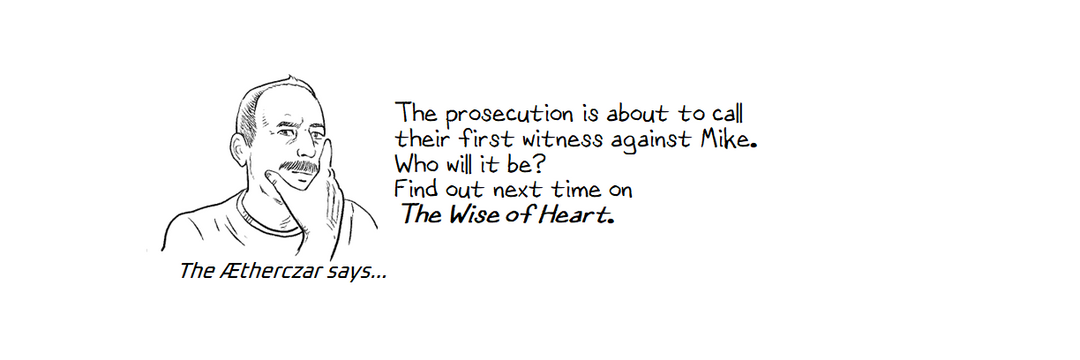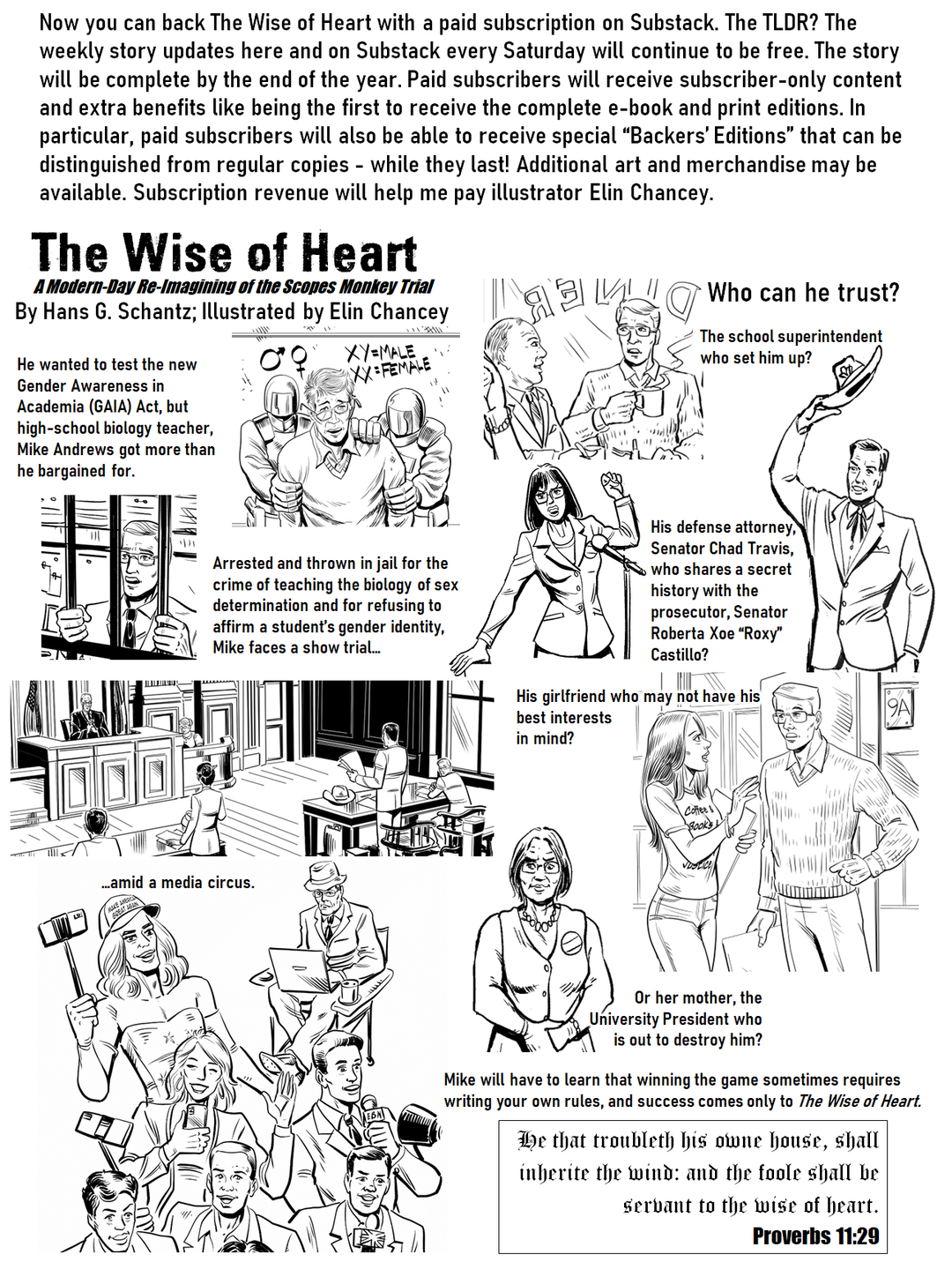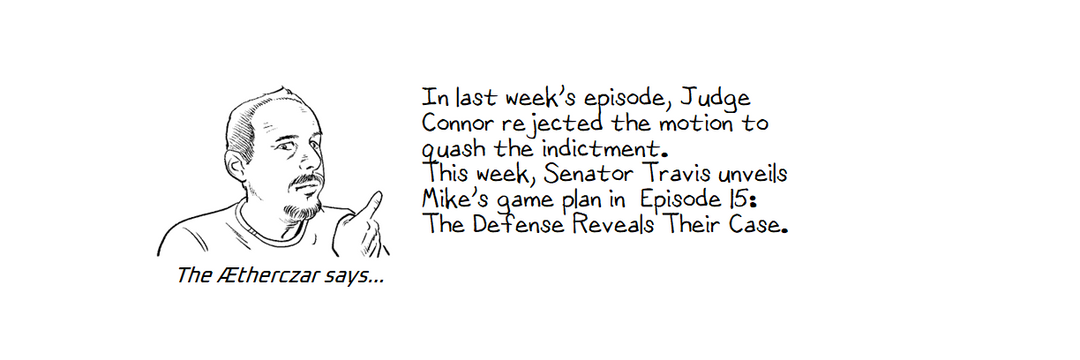
Episode 15: The Defense Reveals Their Case
“Profesora Castillo will present the indictment for the state,” the district attorney announced.
“Last week, the grand jurors for the state aforesaid,” Senator Castillo rose and read the indictment, “being duly summoned, elected, empaneled, sworn, and charged to inquire for the body of the county aforesaid, upon their oaths present:
“That Michael Philip Andrews, heretofore on the 24th day of this past month, in the county aforesaid, then and there, unlawfully did willfully teach in the public schools of this county, which said public schools are supported in part and in whole by the public school fund of the state, a certain theory or theories that deny the gender definition adopted by one or more persons and did teach instead that gender identity has a biological meaning independent of any person's chosen preference, the said Michael Philip Andrews being at the time, or prior thereto, a teacher in the public schools of this county, aforesaid, against the peace and dignity of the state.”
Senator Castillo lowered the paper and concluded. “Signed and certified by the district attorney in and of the aforesaid county.”
“What is your plea, gentlemen?” the judge asked the defense.
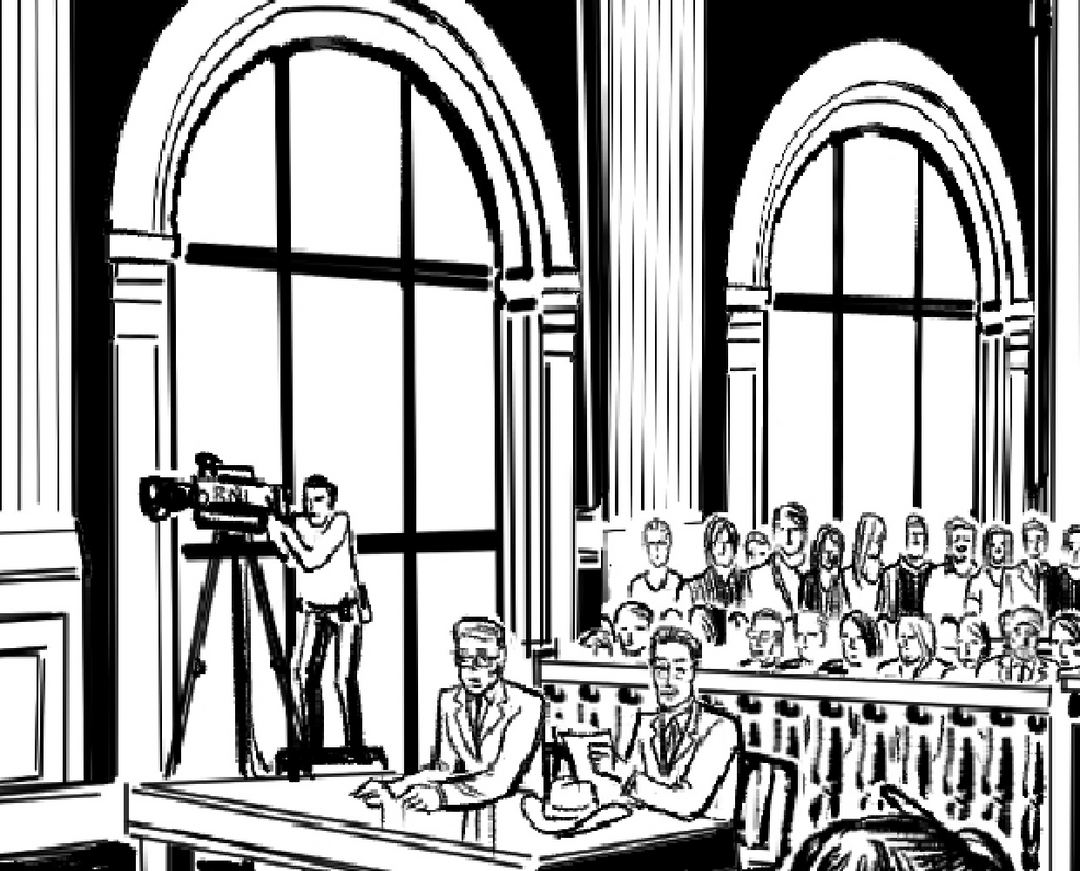
Senator Travis rose, “Not guilty, your honor.”
“Not guilty,” the judge acknowledged. “Now, lady and gentlemen, I shall ask the counsel for both sides to make an opening statement, in which you will please briefly outline what your theory is in the case, before I swear the jury.”
Senator Castillo rose. “It is the position of the state in this case, that the defendant, Dr. Michael Philip Andrews, has violated the GAIA Act, by teaching in the public schools of this county the biological theory of sex determination, thus denying the gender definition adopted by one or more persons.” She sat and looked over at Senator Travis.
“If the court pleases,” Senator Travis rose and began his statement, “may I, for the purpose of the record, on the opening statement of the state move to dismiss the case of the prosecution?”
“Yes,” the judge confirmed, “and I overrule the motion.”
“And I take an exception,” Senator Travis declared.
“So noted,” the judge confirmed. “Order in the courtroom,” the judge banged his gavel at the sudden noise of the journalists’ reporting his overruling of the defense motion to dismiss. “Now may I have your statement, Professor?”
“If the court please,” Travis began, “for the purpose of brevity, though it is impossible to be as brief as the present conception of the prosecution's case, and for the purpose of accuracy, I will stick to my notes, with regard to the statement of the defense. It is going to take a long while.”
“I don't want any argumentative statement made,” the judge admonished Senator Travis. “I just want a brief statement of your theory.”
“I understand that, your honor,” Travis confirmed, “but we have more than one theory.”
“Very well,” the judge agreed. “Give us your theories, then.”
“Yes, your honor.” Senator Travis stood to address the judge and jury. “The defendant, Dr. Michael Philip Andrews, has been indicted for the alleged violation of the Gender Awareness in Academia or GAIA Act, an act passed by the state legislature, which inhibits the teaching of the biological theory of sex in our universities, and in all other schools of the state which are supported in whole or in part by public school funds. The act provides:
“…that it shall be unlawful for any teacher in any of the Universities, and all other public schools of the State which are supported in whole or in part by the public school funds of the State, to teach any theory that denies the gender definition adopted by any person, and to teach instead that gender identity has a biological meaning independent of any person's chosen preference.
“The defense contends that to convict Dr. Andrews, the prosecution must prove not one, but TWO things: first that Dr. Andrews taught ‘any theory that denies the gender definition adopted by any person,’ and second that Dr. Andrews instead taught ‘that gender identity has a biological meaning independent of any person's chosen preference.’”
“The prosecution must prove that the defendant, Dr. Andrews, did these TWO things, AND they must prove what he taught was a violation of the statute. To the contrary, we will demonstrate that, whether this statute be constitutional or unconstitutional, the defendant Dr. Andrews DID not and COULD not violate it. We maintain that since the defendant, Dr. Andrews, has been indicted under a statute which prohibits the teaching of the biological theory of sex, the prosecution must prove as part of its case what that theory is, and how it is in conflict with their concept of gender definition and their idea of how affirmation works.
“So that there shall be no confusion or misunderstanding or misinterpretation of our position, we wish to state our position at the very beginning that the concept of a personally chosen gender identity is a potentially arbitrary personal choice that by its nature cannot possibly conflict with the truths of biological science. Perhaps it’s psychology. Perhaps sociology comes into play. Perhaps it’s environment, or upbringing, or parenting. Perhaps it’s merely a personal whim. Our position is that gender identity has no biological meaning, and therefore, it is impossible for any scientific biological teaching to conflict with it. If there is a genuine conflict with the simple truths of biological science, that is a matter for the prosecution to attempt to prove, and we stand ready to rebut their claims.
“A further defense is a principle we lawyers call ‘necessity.’ A police officer responding to a call may violate the speed limit, for instance, in an emergency. Your home is your castle, but a fireman may break down your door if your home is on fire and he wants to make sure there’s no one inside in need of rescue. If someone is threatening your life and you absolutely need to get away from them, the law might excuse the fact you were drunk while you were driving if you only drove just far enough to remove yourself from harm. The general principle is that anyone, particularly a public servant, may be excused from breaking the law, if doing so serves a higher purpose, or inflicts a lesser harm to avoid a greater harm. The state employed Dr. Andrews to teach biology to his young charges. The state even mandated what book he was to use. And Dr. Andrews obeyed that mandate, followed that higher purpose, even though it may have put him at risk of violating the GAIA Act.
“Why is what Dr. Andrews taught so important? We wish to set before you scientific evidence of this nature in order to stress the importance of the biological theory of sex. Our sexual biology does define in large part who we are. It defines which of us may father children and who may bear and give birth to them. It defines which diseases we are more or less subject to, and how our medical care and treatments may be optimized. If teaching the biological theory of sex is to be excluded by law, you will have to find adequate training for your doctors in medical schools outside of your state or you will have to import physicians from Texas or elsewhere, just as the defendant had to import me for his defense.

“The biology of sex has broader applications. From animal husbandry, to the pollination of plants, to agriculture, to medicine. All these magnificent accomplishments, these brilliant understandings, this superb work that cures our diseases and puts food on our tables, the state would have us discard so as not hurt the feelings of a few confused individuals.”
“Your honor,” Castillo rose. “The defense is being argumentative.
“Sustained,” the judge ruled. “I have asked for a summary of your theory of the case,” the judge explained, “not an argument. Your opportunity for that will come later, Professor Travis.”
“If the court please,” Senator Castillo interjected, “the state further objects to ‘Professor’ Travis reading any theories in regard to biology and its applications. In other words, may it please this honorable court, the question will present itself to your honor as to whether or not the scientific witnesses the defense wishes to call are competent. The defense is undertaking now, under his statement to influence the jury by reading a statement to them.”
“Just a moment,” Senator Travis replied, “if your honor will hear me on that statement…”
“You wait until I get through,” Senator Castillo cut him off.
“Yes,” Travis acknowledged, “but I do not want his honor to rule until you hear me.”
“We do not want him to read that,” Senator Castillo insisted. “Naturally if it is read, and your honor rules these scientific and medical witnesses are incompetent for the defense, then the defense has no right to read a theory or theories on biology in the presence of this jury, in order to prejudice them one way or the other, and present an argument in support of it.”
All eyes were on the judge.
“I think it is proper for the court to withhold ruling upon these questions,” the judge decided at last, “until the evidence is offered. I will instruct the jury that this attorney, ladies and gentlemen of the jury, is merely making a statement that is not proof in the case. He is merely outlining what he hopes to prove, what his theory is. It is your duty to hear the defense statement, but keep in mind that it is not evidence, and that you are not to consider this statement in determining the issues. The purpose of the statement is to get before your minds in the beginning what they hope or propose to prove. Now, the court may later allow him to prove these theories, or the court may not allow those theories to be proven. It is impractical for me to chop up his statement, so I will just let him proceed.”
“Your honor,” Travis acknowledged the judge, “I entirely agree with the court, and I could not have stated it better myself. The defense is not pretending to give testimony, the defense is merely explaining its theory, and if, when we offer this testimony, your honor does not want it, he can reject it.”
“Yes,” the judge concurred. “Go ahead, Professor, but keep the argumentation to a minimum.”
“Yes, your honor,” Travis acknowledged, and then continued reading his statement from where he left off.
“If your honor please,” Senator Castillo interrupted, “we again renew our motion to strike the argument and instruct the jury that it is unprecedented and unknown to the forms of law, for a lawyer to attempt to discuss his case before the jury before the issues are made up. Your honor asks both sides to present the issues not to the jury, but to your honor. Then, your honor submits the issues to the jury, the testimony is given by the witnesses, and your honor gives them the law.”
“That IS the procedure,” Senator Travis acknowledged, “however…”
“This is wholly improper,” Senator Castillo interrupted, “and argumentative. It is not a statement as to what the issues are. Your honor has already held that this act is constitutional, it being the law of the land. There is but one issue before this court and jury, and that is, ‘did the defendant violate the statute?’ That statute interprets itself, and says that whenever a teacher denies the gender definition adopted by any person and teaches instead that gender identity has a biological meaning independent of any person's chosen preference, he is guilty of a misdemeanor. Does the evidence show that he did that? That is the only issue, if it please the honorable court, before this jury.
“My senatorial colleague is bound and determined to present an inappropriate stump speech for his ideology. But this is not the senate floor, this is not the campaign trail, this is not a fundraising dinner, and much as my distinguished colleague might like to pontificate, he is too far from Texas for this to be a get-out-the vote rally.”
There was some laughter in the courtroom, but Senator Castillo pressed on, ignoring it.
“That is not proper, if your honor please. If it is proper, it would be like a couple of gentlemen, where they were engaged and were trying a lawsuit, and they had a large number of witnesses. Finally, one lawyer said, ‘let us have a conference,’ and they went out to confer, and they came back in and said, ‘if your honor please, the witnesses in this case, some of them are not very well, others are awfully ignorant, and we have just agreed among ourselves to dispense with the evidence, and instead to just argue the case.’ That is what my good friend, Chad Travis, wants to do.”
Laughter broke out in the courtroom. The judge banged his gavel for order.
“And that is exactly what he has done, your honor,” insisted Senator Castillo. “I object, and hence I make that motion to instruct the jury that they must not consider Professor Travis’s argument for the present, but instead, to give him a chance, after a while, to take his shot again.”
Senator Travis rose. “Your honor, I am very happy that my distinguished colleague has presented her theory of the case. We are willing that the prosecution should state all of the theories they have about this matter. We do not want to shut them off from stating anything in their minds relevant to this matter. So far as I am concerned, I believe your honor correctly instructed the jury that what I have stated to the court and the jury, THAT is our theory of the case. We are prepared to back it up by the evidence to the jury. The jury, we believe, is an intelligent body of citizens that can tell the difference between testimony taken from the witnesses, and the oratorical flights of the Profesora and myself.”
“Any further statement from the state's side?” the judge asked.
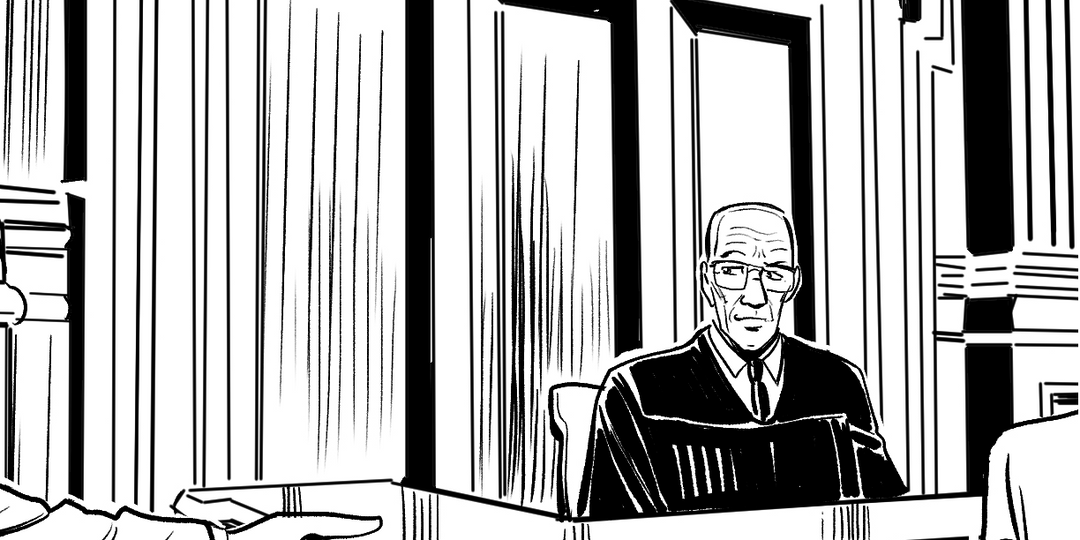
“None, your honor,” Senator Castillo replied.
“Then I will overrule your objection and allow the defense to continue,” the judge ruled. “I have already instructed the jury, and I remind them yet again that the defense is merely making a statement of what they HOPE to prove in this case. It is not evidence or proof in and of itself, and it should not be considered in determining the issues. The same can be said of the state’s theory of the case as well.”
The judge pointed his gavel at the defense table. “Professor Travis, please continue.”
“Thank you, your honor,” Travis acknowledged the judge’s ruling. “I will summarize the defense position for the court. To convict Dr. Andrews, the prosecution must prove TWO things: first that Dr. Andrews taught ‘any theory that denies the gender definition adopted by any person,’ and second that Dr. Andrews instead taught ‘that gender identity has a biological meaning independent of any person's chosen preference.’ The prosecution must prove as part of its case WHAT that theory is, and HOW it is in conflict with their concept of how gender definitions work.
“Our theory is that there IS NO CONFLICT between the science of biology on the one hand,” he gestured with his left hand, “and the arbitrary proclamation of gender identity on the other hand.” Senator Travis held out his right hand in supplication to the jury. “The concept of a so-called ‘gender identity’ has no biological meaning, and therefore, it is impossible for any scientific biological teaching to conflict with it.”
“We’re disappointed the state has not taken advantage of this opportunity to present their theory of how these two things conflict, and we assert that the prosecution must prove as part of its case what that biological theory of sex is, and how it is in conflict with their concept of how gender definitions work.”
“Argumentative,” Castillo objected.
“Sustained,” the judge ruled.
Senator Travis forged on. “In addition, we will be arguing a defense of ‘necessity.’ Even if you may find that Dr. Andrews did violate the GAIA Act, as a public servant in the course of his duties he had certain responsibilities. He had a responsibility to teach the subject matter the state told him to teach from the textbook the state chose for him. He had an obligation to educate the youth in his charge, and he had an obligation to follow the higher purpose of educating his students in the facts of biological science even at the risk of trespassing on the lesser obligation of following the GAIA Act.
“That is our theory of the case,” Senator Travis summarized and resumed his seat.
“Members of the jury,” the judge declared. “You will rise, hold up your right hands, and be sworn to try this case.”
After the jury was sworn in, the judge issued his instruction.
“You have sworn to decide this case upon the law and upon the evidence,” Judge Connor began. “Therefore, the vital question now involved for your consideration is, has the statute been violated by the said Dr. Michael Philip Andrews by teaching a theory that denies the right of a student to identify with whatever gender they prefer and instead teaches that sex is biologically determined.”
The judge looked over his reading glasses at the Jury.
“If you find the statute has been thus violated, you should find Dr. Andrews guilty. Otherwise you should find him innocent. You will bear in mind that in your deliberations, you are not interested to inquire into the policy or wisdom of this legislation. The policy and wisdom of any particular legislation address itself to the legislative branch of government, provided the proposed legislation is within constitutional limitations. Our Constitution imposes upon the judicial branch the interpretation of statutes and upon the executive branch the enforcement of the law.
“Is the state ready?”
“Yes, your honor,” the district attorney confirmed.
“The defense?”
“Ready, your honor.”
“The state may call its first witness,” the judge pointed his gavel toward the prosecution table.
